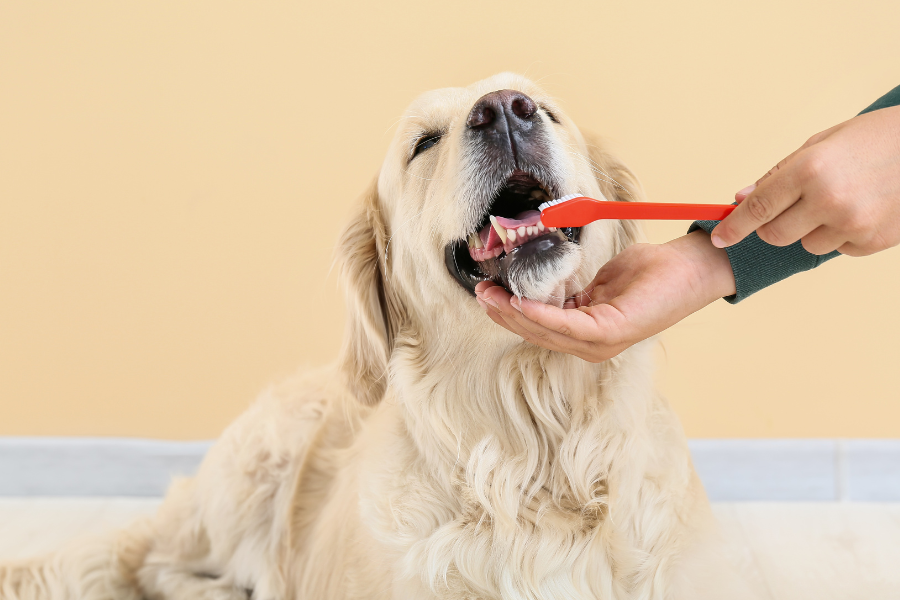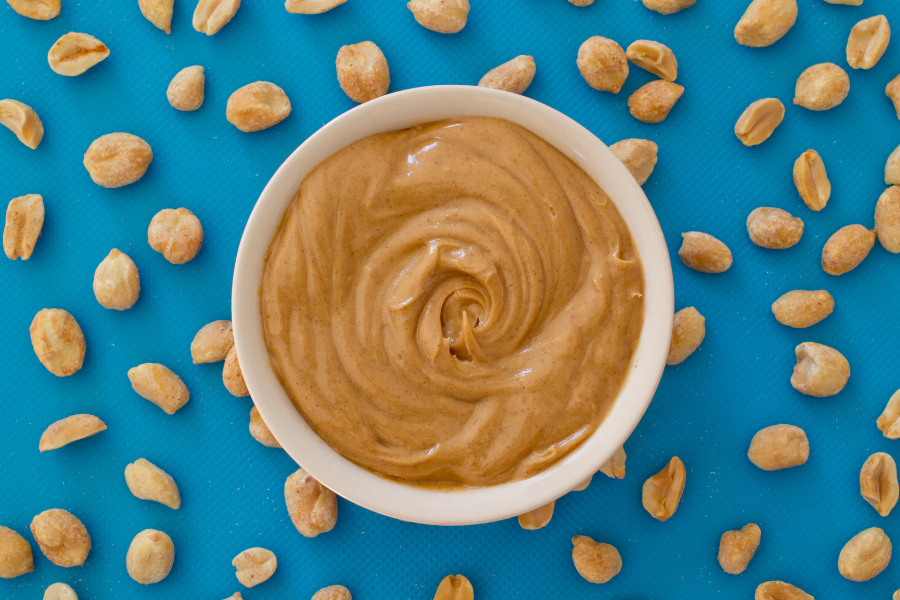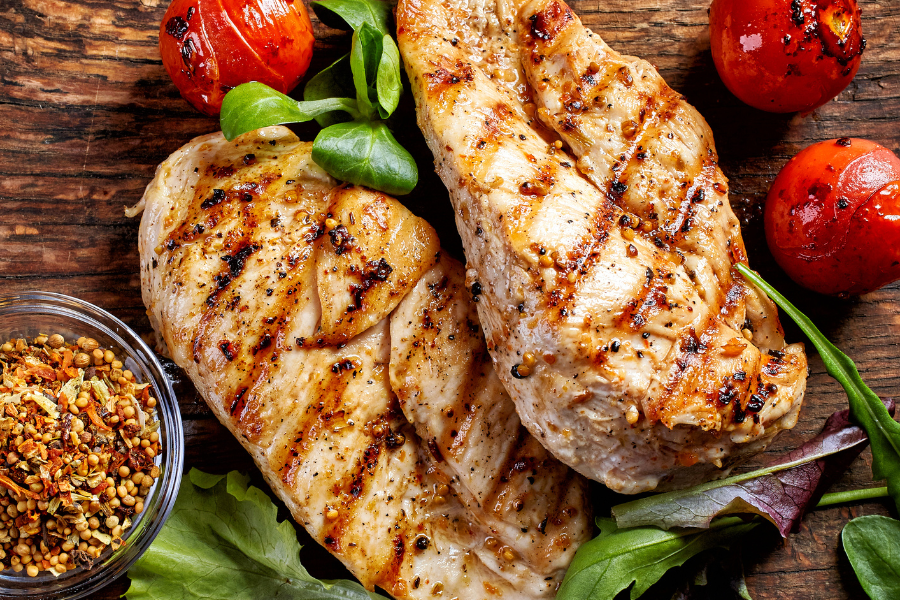One thing that is often overlooked as a dog owner is dental care. Dog's don't need to have their teeth brushed, right? Wrong! They actually do need their teeth brushed, and regularly. If you have ever noticed your dog's breath is not puppy breath anymore, or if you have noticed some tarter buildup on their teeth, they are likely in need of a good teeth brushing!
Dogs are similar to us humans in many ways, including the need for regular dental care to stay healthy and happy. We will brush into the details and secrets of doggy dental care, and answer the burning question you have "how often should I brush my dog's teeth?"
Why Brushing Your Dog's Teeth is Crucial
So why is brushing your dog's teeth important, anyway? And don't dogs have naturally clean mouths? While this is somewhat true - dogs do have cleaner mouths than humans, and dogs actually have enzymes in their saliva that helps them kill bacteria, a dog's mouth is not a germ-free zone by any means. Dog's teeth can build up plaque, tarter, and germs just like humans, which can lead to disease.
This is why regular brushing and dental health is important in dogs!
Preventing Dental Diseases
Just like humans, dogs can develop dental diseases. Gingivitis, periodontitis (a lot of things ending in "itis"), and tooth decay are common problems that can lead to pain, tooth loss, and even more severe health issues. By brushing your dog's teeth, you can prevent plaque buildup and keep their gums healthy.
Dental Health and Overall Health
What is more (if you did not already know this), is that dental health translates to and affects overall health, in humans and dogs. Bacteria infections in the mouth can spread to other parts of the body, so regular brushing and dental care are key for overall doggy (and human) health.
How Often Should You Brush Your Dog's Teeth?
Finally, the question you need an answer to. How often should you be brushing your pooch's teeth? While daily brushing is the gold standard, 3-4 weeks is ideal. Let's break that answer down a doggy bit more.
Daily Brushing
Daily brushing is the gold standard of canine dental care. We get it, that may seem like a lot to most dog owners! But daily brushing can really ward off any plaque and bacteria buildup. If this is simply not possible for you, a few times a week will cut it, and make a big difference in your dog's dental health.
Consistency is Key
If daily brushing isn't possible, aim for at least 3-4 times a week. And like a lot of healthy behaviors, it is all about building routine. Once you get into the regularity of the routine (whether it is daily or a pre-selected 3-4 days a week), you won't even think twice.
Professional Cleanings
Let's kick things up a notch. To ensure your dog stays at the pinnacle of their dental health, schedule a professional cleaning for them once per year. Your vet can do this, and like a dental cleaning for humans, a professional will do a deeper clean than you can do yourself.
Getting Started with Dog Teeth Brushing
Now that we have covered the basics, you might be wondering "how the heck do I get started?" It may be easier than you think!
Choose the Right Tools
First things first, human toothpaste is a no-go for dogs. It can be harmful to them, so save your toothpaste for yourself. There are plenty of dog-specific toothpastes on the market, in all sorts of flavors dogs love. There are also finger brushes (which, exactly as it sounds, you put like a glove over your index finger), which we love. Finger brushes make things easy, especially for beginners!
Make It a Positive Experience
Be patient, go slowly, and try your best to make it a positive experience for your pup. Things
Start slow and make it a positive experience. Use treats, praise, and lots of patience. Begin by letting your dog sniff the toothbrush and taste the toothpaste. Gradually work up to brushing a few teeth at a time.
Establish a Routine
Consistency is key. Try to brush your dog's teeth at the same time every day. Whether it's after breakfast or before bedtime, establishing a routine will make the process smoother.
Understanding Toothpaste and Toothbrushes for Dogs
Choosing the right toothpaste and toothbrush is essential. Here's what you need to know.
Dog-Safe Toothpaste
Dog toothpaste comes in various flavors like chicken, beef, and peanut butter. Choose a flavor your dog loves to make the process enjoyable. Never use human toothpaste, as it contains ingredients that can be toxic to dogs.
Toothbrush Options
Dog toothbrushes come in different shapes and sizes. Some dogs prefer finger brushes, while others do better with a traditional dog toothbrush. Experiment to find what works best for your pup.
Regular Replacement
Just like human toothbrushes, dog toothbrushes need to be replaced regularly. Make sure to replace your dog's toothbrush every 3-4 months or sooner if it shows signs of wear.
Signs Your Dog Needs Dental Care
Sometimes, despite our best efforts, dental issues can arise. Here are some signs that your dog may need professional dental care.
Bad Breath
While some doggy breath is normal, excessively bad breath can be a sign of dental issues. If your dog's breath smells particularly foul, it's time for a dental check-up.
Discolored Teeth
Yellow or brown stains on your dog's teeth indicate plaque and tartar buildup. Regular brushing can prevent this, but professional cleaning may be necessary if it gets too severe.
Red or Bleeding Gums
Healthy gums should be pink and firm. Red, swollen, or bleeding gums are signs of gingivitis or other dental problems. A vet visit is crucial if you notice these symptoms.
The Role of Diet in Dental Health
Believe it or not, your dog's diet plays a significant role in their dental health. Let's explore how.
Crunchy Foods
Dry kibble can help reduce plaque buildup compared to wet food. The crunchiness helps scrape off some of the plaque as your dog eats. Some specially formulated dental diets are even more effective.
Dental Treats and Chews
Many dental treats and chews are designed to promote dental health. These can be a great addition to your dog's routine but shouldn't replace regular brushing. Look for products approved by the Veterinary Oral Health Council (VOHC).
Avoiding Sugary Treats
While it's tempting to spoil your dog with treats, avoid giving them sugary snacks. Sugar can contribute to plaque buildup and dental issues. Stick to healthy, dog-friendly treats.
The Importance of Regular Vet Visits
Regular vet visits are essential for maintaining your dog's dental health. Here's why.
Professional Cleanings
Your vet can do this! Thorough cleanings are something that you can't achieve at home. These cleanings remove plaque and tartar buildup and help prevent dental diseases.
Early Detection
Regular dental check-ups allow your vet to catch any issues early. Early detection means more effective treatment and less discomfort for your dog.
Personalized Advice
Your dog is unique and may need specific things (or a different frequency) incorporated into their routine than other dogs. Your vet will be able to recommend tailored dental recommendations for your dog.
Making Dental Care Fun
Dental care doesn't have to be a chore. Here are some tips to make it fun for both you and your dog.
Interactive Toys
There are fantastic toys on the market that can help you make your dog's dental routine fun, for them and for you! Try googling "dog dental toys" for options online. We like a toy that has ridges on it to help clean our dog's teeth as they play.
Incorporate Training
Knock two birds out with one stone by making your doggy dental care routine a training sesh! You can use positive reinforcement (i.e. treats and praise) during and after teeth brushing, which will only reinforce their good behavior.
Celebrate Milestones
Celebrate milestones in your dog's dental care routine. Whether it's their first successful brushing or their first professional cleaning, make it a special occasion. Your dog will pick up on your enthusiasm.
Common Myths About Dog Dental Care
There are a ton of myths about dog health and dog dental care. We are going to debunk a few of the most common ones below.
Myth 1 - Dogs Don't Need Dental Care
Not true. We get it the thought - wild animals don't brush their teeth, right! True, but dogs are domesticated and we want them to live longer lives. Plus, their diets are much different than that of wild animals.
Myth 2 - Dry Food Cleans Teeth
Dry dog food can be an important part of a dog's dental care (it can help to reduce some plaque buildup), but it is no substitute for brushing.
Myth 3 - Dental Treats Are Enough
Similar to dog food, some dog treats can help reduce plaque buildup. Again, like dog food, dental treats should not replace regular teeth brushing.
Conclusion
Doggy dental care (we love that phrase, by the way) is more important than most people think. To ensure your dog stays healthy, it is key to brush their teeth regularly (around 3-4 times a week is ideal), and make sure they have a healthy, balanced diet. Remember, dental health is vital to overall health, and just a little effort can go a long way in terms of preventing dental disease and infection.
FAQ
Is it OK if I don't brush my dog's teeth?
Nope, it is definitely not ok! Not brushing your dog's teeth can leave them at a high risk for developing dental diseases like periodontal disease (no fun), which can lead to other, more serious issues.
Are You Supposed to Brush Your Dog's Teeth Every Day?
In an ideal world, yes, you would brush your dog's teeth every day. If this is too much effort, or you simply cannot make daily brushing happen, 3-4 times a week will still make a huge impact on your dog's dental well-being.
Is It Too Late to Brush My Dog's Teeth?
Say you have a pup that, well, is not a pup anymore, and you have never brushed their teeth (we have been their). Is it ever too late to start? The answer to this is absolutely not! Even if your dog is a bit older, brushing their teeth can only help their mouths and overall health. If they are hesitant, have them taste the dog-friendly toothpaste your bought first, then ease into the brushing slowly,with plenty of praise!
References
1) Cunha E, Tavares L, Oliveira M. Revisiting Periodontal Disease in Dogs: How to Manage This New Old Problem? Antibiotics (Basel). 2022 Dec 1;11(12):1729. doi: 10.3390/antibiotics11121729. PMID: 36551385; PMCID: PMC9774197.



